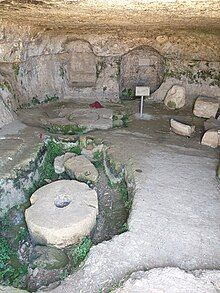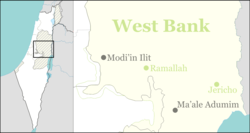Psagot
Psagot | |
|---|---|
 | |
| Coordinates: 31°53′57″N 35°13′26″E / 31.89917°N 35.22389°E | |
| District | Judea and Samaria Area |
| Council | Mateh Binyamin |
| Region | West Bank |
| Affiliation | Amana |
| Founded | 1981 |
| Founded by | Beit VeGan residents |
| Population (2022)[1] | 2,086 |
Psagot (Hebrew: פְּסָגוֹת, lit. 'Peaks') is an Israeli settlement in the West Bank, located on Tawil hill, adjacent to the Palestinian cities of Ramallah and al-Bireh. Established in 1981, it is organised as a community settlement and falls under the jurisdiction of Binyamin Regional Council, with the council's headquarters located there.[2] In 2022 it had a population of 2,086.
The international community considers Israeli settlements in the West Bank illegal under international law, but the Israeli government disputes this.[3]
The Israeli Psagot Winery was established in the settlement on privately owned Palestinian land; a demolition order (COGAT Order 252/03)[4] was issued by the Israeli authorities against the winery as, even under Israeli law, the Israeli building over privately-owned land was illegal. As of 2019, the order had yet to be enforced.[5]
Etymology
The name Psagot was proposed by one of the early residents, Moshe Bar-Asher, a professor and head of the Academy of the Hebrew Language. It expresses the hope that the new village will achieve a peak in settlement and study of the Torah.[6] The name also refers to the location of Psagot on the peak of Mount Tawil.[2]
History
The Arabic name of the hill is Jabel Tawil (long mountain).[7]

In the wake of the 1948 Arab–Israeli War, and after the 1949 Armistice Agreements, Jabel Tawil came under Jordanian rule. It was annexed by Jordan in 1950.
Before 1967, Jabel Tawil was known to locals as "Kuwaiti hill" because of numerous visitors from the Persian Gulf who hiked in the area.[8][6] In 1964, some of the land was purchased by the Jerusalem municipality for a future tourist resort.[8] In the Six-Day War, it came under Israeli occupation. From September 1976, Arabs were prohibited from building in the area.[9]
According to ARIJ, Israel confiscated 780 dunams of land from the nearby Palestinian town of Al-Bireh in order to construct Psagot.[10] There is also an archaeological site near some of the Caravillas on the hill of Psagot.
In 1981, Ariel Sharon, then Israeli Minister of Defense, told Pinchas Wallerstein, head of the Mateh Binyamin Regional Council, that he would support initiatives to settle the area.[6] In July 1981, Wallerstein moved the council headquarters to the hill, then occupied by a military intelligence base. Five families from the Jerusalem neighborhood of Beit VeGan took up residence there. A year later, they were joined by a group from the Kerem B'Yavneh yeshiva who came to create a kollel.[8][6]


Israeli–Palestinian conflict

According to B'Tselem, Psagot prevents the expansion of Ramallah and cuts it off from the surrounding villages.[11] During the course of the Second Intifada, snipers shot at Psagot from buildings in Ramallah, leading to the construction of a concrete wall to protect the inhabitants. In 2001, the Israeli army stationed nearby fired two missiles into Ramallah targeting Marwan Barghouti.[12]
In November 2009, the Psagot settlement and Regavim petitioned the High Court of Justice in an unsuccessful attempt to stop construction of the Al-Bireh International Stadium, citing security concerns.[13]
The Sasson Report identified Psagot as the "parent settlement" of an Israeli outpost known as Mitzpe HaAi (Hebrew: מִצְפֵּה הָעָי) located approximately 400 m to the southeast.[14] According to the report, the settlement, unauthorized by the government, was built on land appropriated illegally from its Palestinian owners. According to Peace Now 75.69% of the combined area of Psagot and Mitzpe HaAi is on appropriated private land.[15]
Status under international law
The international community considers Israeli settlements to violate the Fourth Geneva Convention's prohibition on the transfer of an occupying power's civilian population into occupied territory.[16]
Israel disputes the applicability of the Fourth Geneva Convention and argues that the Palestinian territories were not legally held by a sovereign when Israel took control of them. This view has been rejected by the International Court of Justice and the International Committee of the Red Cross.[17]
Psagot Winery

The Psagot Winery was founded by Na’ama and Yaakov Berg, who started to plant vineyards either in 1998,[18] or 2002.[4] Berg, who immigrated to Israel from the Soviet Union, is the CEO.[4] According to the Independent, in 2007 the Falic family of Florida, who own Duty Free America, purchased 32,000 shares in Psagot winery for 4.1 million shekels, becoming majority shareholders and directors.[19] In addition to a modern barrel cellar, some of the oak barriques are stored in a cave dating back to the Second Temple era. The winery's top wine is a Bordeaux blend named Edom. Regular varietal wines are produced in the Psagot series and there is also a Port-style wine. In 2007 and 2008, the winery produced 65,000 bottles annually.[20] In 2010, the winery produced 80,000 bottles of wine a year, the majority for export. By 2015, the number produced had grown to 250,000 bottles per year, of which 65% are exported.[21] Palestinian Arabs and Israeli Jews work there side by side which, according to Akiva Novick, creates an island of co-existence in sea of mistrust.[22][23] The American evangelical Christian organization HaYovel has sent volunteers to tend and harvest Psagot Winery's vineyards.[24] Non-Jews are not allowed to work in the vineyard itself, for kosher reasons.[22] Berg says calls to boycott his wines have only increased demand.[18] The winery has developed into "a favourite destination" for right-wing Israeli and American politicians.[21] Other wineries exist around Psagot, and the Yesha Council hopes to make them a tourist attraction. According to the local Palestinians and the Israeli human rights group Yesh Din, the wineries are partially planted on privately owned Palestinian land.[25][26] Israeli officials confirmed that the Berg house lies atop a quarter hectare of privately owned Palestinian land; in 2003 a demolition order (COGAT Order 252/03)[4] was issued by the Israeli authorities against Mr Berg’s home as, even under Israeli law, his decision to build on the privately owned land is illegal. As of 2019, the order had yet to be enforced.[5]
Writing in November 2019, Gideon Levy and Alex Levac noted:
"The land is owned by Palestinians, with documents to prove it – but is now the site of a Jewish winery."[..] "This is the estate of Yaakov Berg, CEO of the Psagot winery, in the central West Bank. Berg’s house stands on section 233 of bloc No. 17. This property belongs to two sisters, Amal and Keinat Quran and their cousin, Karima – but they don’t have any access to it. The grapes are planted on sections 219-220, which is owned by Huria Quran, another relative. That petite, elderly woman is also unable to get to her property."[27]
In November 2020, US Secretary of State Mike Pompeo became the first top US official to visit an Israeli settlement including the Psagot Winery.[28]
EU legal proceedings
The company initiated legal proceedings in Europe to try to reverse regulations requiring settlement produce to be labelled.[19] On 12 November 2019 the Court of Justice of the European Union in a ruling[29] covering all territory Israel captured in the 1967 war decided that labels on foodstuffs must not imply that goods produced in occupied territory came from Israel itself and must "prevent consumers from being misled as to the fact that the State of Israel is present in the territories concerned as an occupying power and not as a sovereign entity". In its ruling, the court said that failing to inform EU consumers they were potentially buying goods produced in settlements denies them access to "ethical considerations and considerations relating to the observance of international law".[30]
Canadian legal proceedings
The Winnipeg Jewish university instructor David Kattenburg won a similar judgement in a Canadian court against the fraudulent branding of settlement wines for export, naming the Psagot products on sale in his country.[31][4][32] In May 2021, the Federal Court of Appeal dismissed a government appeal and ordered CFIA to explain its decision. Kattenburg submitted information to CFIA in September 2021 showing that the Psagot Winery was situated entirely on Palestinian property. In May 13, 2022, the CFIA reaffirmed its original decision.[33]
References
- ^ "Regional Statistics". Israel Central Bureau of Statistics. Retrieved 21 March 2024.
- ^ a b HaReuveni, Immanuel (1999). Lexicon of the Land of Israel. Miskal – Yedioth Ahronoth Books. p. 795. ISBN 965-448-413-7.
- ^ "The Geneva Convention". BBC News. 10 December 2009. Retrieved 27 November 2010.
- ^ a b c d e David Kattenburg, 'Inside the mind of an Israeli settler,' Mondoweiss 13 November 2019.
- ^ a b "Grapes of wrath: how wine could bottle the Israeli-Palestinian peace process". The Independent. 14 June 2019. Retrieved 12 November 2019.
- ^ a b c d Hoberman, Haggai (2008). Keneged Kol HaSikuim [Against All Odds] (in Hebrew) (1st ed.). Sifriat Netzarim. pp. 196–7.
- ^ E. H. Palmer (1881). The Survey of Western Palestine. Vol. Arabic and English name lists. London: The Committee of the Palestine Exploration Fund. p. 296.
- ^ a b c Hilal, Sandi; Alessandro Petti; Eyal Weizman (Spring 2009). "The Future Archaeology of Israel's Colonisation". Afterall Journal (20).
- ^ Arab Women's Information Committee; Lebanese Association for Information on Palestine (1 January 1977). The Arabs Under Israeli Occupation, 1980. Inst for Palestine Studies. p. 67.
- ^ Al Bireh City Profile ARIJ, p. 17
- ^ "Brighton & Hove Palestine Campaign – Supporting the struggle to achieve a just and lasting peace for Palestine". www.brightonpsc.org.
- ^ Whitaker, Brian (3 September 2001). "The summit of Middle East tension". Guardian. Retrieved 28 October 2010.
- ^ Hass, Amira (27 November 2009). "Settlers petition to tear down nearby Palestinian stadium". Ha'aretz. Retrieved 31 October 2010.
- ^ Opinion on Unauthorized Settlements, Prime Minister's Office, 2005, Appendix I, "Detailed list of settlements", p. 37
- ^ Psagot and Mitzpe Ha'ai (outpost) [dead link] Peace Now.
- ^ The settlers' struggle BBC News. 19 December 2003
- ^ Legal Consequences of the Construction of a Wall in the Occupied Palestinian Territory Archived 6 July 2010 at the Wayback Machine International Court of Justice, 9 July 2004. pp. 44-45
- ^ a b Where you stand changes the view, Haaretz
- ^ a b "US Duty Free magnates bankrolled expansion of Israeli settlement vineyard over Palestinian land". Independent. 6 July 2019. Retrieved 12 November 2019.
- ^ Psagot Winery at Rogov's Reviews
- ^ a b "Europe steps up pressure on Israel over its settlements". The Economist. 12 November 2015. Retrieved 15 November 2015.
- ^ a b Peace with a paycheck, YNET, by Akiva Novick, 08.25.10
- ^ Eglash, Ruth (29 November 2015). "'Blessings of Israel': Settlers find new ways to label products after E.U. decision" – via www.washingtonpost.com.
- ^ Jeffay, Nathan (25 March 2012). "Christians Called To Serve Jewish Settlers". The Forward. Retrieved 7 April 2012.
- ^ Settler vineyards take root in West Bank BBC. 17 June 2009
- ^ Wallis Simons, Jake. "Meet the Settlers". Telegraph.co.uk. Archived from the original on 14 September 2013. Retrieved 22 May 2018.
The Psagot Boutique Winery, which was established in 2003 just outside the Palestinian capital of Ramallah, is one of the largest, producing 200,000 bottles per year and covering 62 acres. According to the Israeli human rights group Yesh Din, it partially lies on private Palestinian land.
- ^ Something's rotten at this settlement winery – and we don't mean the grapes, Nov. 21, 2019, Haaretz
- ^ "Pompeo makes unprecedented visit to Israeli settlement in West Bank". BBC. 19 November 2020.
- ^ "Foodstuffs originating in the territories occupied by the State of Israel must bear the indication of their territory of origin, accompanied, where those foodstuffs come from an Israeli settlement within that territory, by the indication of that provenance" (PDF). Court of Justice of the European Union. 12 November 2019. Retrieved 17 April 2020.
- ^ "EU court rules goods from Israeli settlements must be labeled". Reuters. 12 November 2019. Retrieved 12 November 2019.
- ^ Brennan Doherty, 'Man challenges CFIA ruling that West Bank wines are 'products of Israel' CBC 8 August 2017.
- ^ Ron Csillag, 'West Bank wines can’t be called Israeli, court finds', CJN 29 July 2019.
- ^ "Canadian agency rules "Produce of Israel" labels violate Canadian law". Mondoweiss. 16 May 2022.

